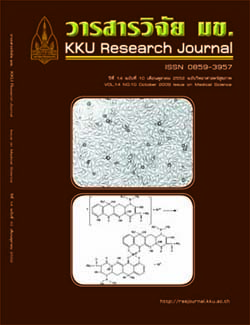The association between iron consumption, nutritional status and academic achievement in primary school students at Khon Kaen University Demonstration school
Main Article Content
Abstract
This study was a survey research in Prathomsuksa 3-6 students aged between 10-13 years in the Demonstration school of Khon Kaen University (Education), Khon Kaen province. The objective of this research was to study the relationship between iron consumption, nutritional status, and school achievement. The data collection included three day food record, anthropometric measurements, and school achievement in 4 topics; mathematics, Thai language, English language, and life experience teaching. The results showed that there was no relationship between nutritional status and school achievement in both sexes. There was a low correlation between iron consumption and school achievement in 2 subjects; Thai language and life experience teaching ( r=0.003, and 0.004, respectively) in boys, but it was not found in girls.
Article Details
References
Halterman J.S., Kaczorowski J.M., Aligne C.A.,Auinger P., Szilagyi P.G. 2001. Irondeficiency and cognitive achievement amongschool aged children and adolescents inthe United States. Pediatrics 107: 1381-1386.
Martorell R., Ramakrihnan U., Schroeder D.G. 1996.Reproduction performance and nutritionduring childhood. Nutr Rev 54 : S15 - S21.
McCann J.C., Ames B.N. 2007. An overview ofevidence for a causal relation between irondeficiency during development and deficitsin cognitive or behavioral function. Reviewarticle. Am J Clin Nutr 85: 934.
Pollitt E, Jacoby E.R., Cueto S. 1996. School breakfastand Cognition among nutritionally at riskchildren in the Peruvian Andes. Nutr Rev54 : S22 - S26.
Pollitt E, Hathirat P. Iron deficiency and educationalachievement in Thailand. 1989. Am J ofClin Nutr 50(3 suppl) : 687-96.
Scott K. P., Stephen L.D. 1996. Total fitness, andwellness. 1st. The United state of America.A Simon & Schuster Company. 87.
Situation of iron deficiency anemia in school agechildren [online]. [Cited 14 August 2006].Available from : http://advisor.anamai.moph.go.th/factsheet/student/anemia.htm.
Troccoli, K.B. and et al. 1993. Eat to Learn, Learnto Eat: The Link Between Nutrition andLearning in Children. Washington, DC:National Health/Education Consortium,1993. A summary appears in: ERICClearinghouse on Elementary and EarlyChildhood Education, çChildrenûs nutritionand learning,é ERIC Digest, Urbana, Illinois,ED369579, June 1994.
Vincint C.B. Nwuga. 1977. Effect of severeKwashiokor on intellectual developmentamong Nigerian children. The Am J ofClin Nutr 30 : 1423-1430.


